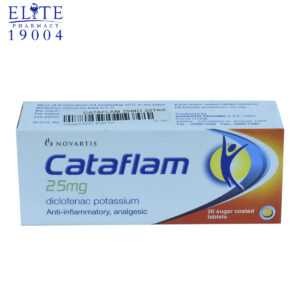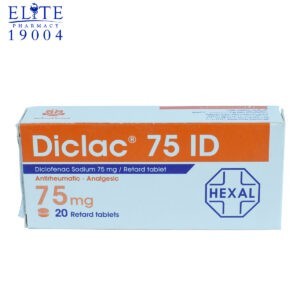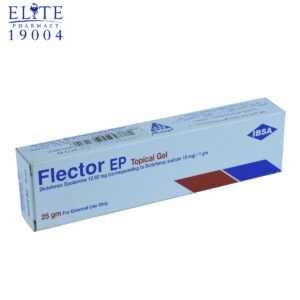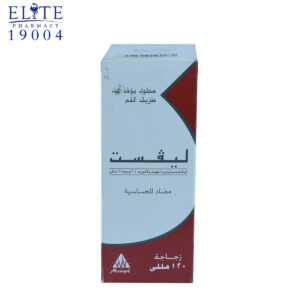declophen 50 mg 20 tab
Home » Shop – Latest Skin and Care Products » Analgesic and anti-inflammatory » declophen 50 mg 20 tab
Featured Products
declophen 50 mg 20 tab
11.25 EGP
- Brand: declophen
- Country of manufacture: Egypt
- Size:20 capsules
- Type: Capsules
- anti-inflammatory
- antirhumatic
- analgesic
Description
declophen Qualitative and quantitative composition
Each film-coated tablet contains 50 mg of diclofenac potassium
Also contains:
Lecithin Soya E322.
0.150 mmol (5.85mg) potassium per 50mg tablet.
0.73mg sodium per 50mg tablet.
For a full list of excipients, see section 6.1
Pharmaceutical form
Film-coated tablets
Reddish brown, circular, coated, biconvex tablets, diameter 9 mm
Clinical particulars
Rheumatoid arthritis
Osteoarthrosis
Low back pain
Migraine attacks
Acute musculo-skeletal disorders and trauma such as periarthritis (especially frozen shoulder), tendinitis, tenosynovitis, bursitis, sprains, strains and dislocations; relief of pain in fractures
Ankylosing spondylitis
Acute gout
Control of pain and inflammation in orthopaedic, dental and other minor surgery
Pyrophosphate arthropathy and associated disorders
Undesirable effects may be minimised by using the lowest effective dose for the shortest duration necessary to control symptoms (see section 4.4 Special warnings and precautions for use).
For oral administration
The tablets should be swallowed whole with liquid, preferably before meals, and must not be chewed or divided.
Adults
The recommended daily dose is 100-150mg in two or three divided doses. For milder cases, 75-100mg daily in two or three divided doses is usually sufficient.
In migraine an initial dose of 50mg should be taken at the first signs of an impending attack. In cases where relief 2 hours after the first dose is not sufficient, a further dose of 50mg may be taken. If needed, further doses of 50mg may be taken at intervals of 4-6 hours, not exceeding a total dose of 200mg per day.
Special populations
Paediatric population
For children over 14 years of age, the recommended daily dose is 75-100mg in two or three divided doses. Diclofenac Potassium Tablets are not recommended for children under 14 years of age.
The use of Diclofenac Potassium tablets in migraine attacks has not been established in children.
Elderly
Although the pharmacokinetics of diclofenac are not impaired to any clinically relevant extent in elderly patients, nonsteroidal anti-inflammatory drugs should be used with particular caution in such patients who generally are more prone to adverse reactions. In particular it is recommended that the lowest effective dosage be used in frail elderly patients or those with a low body weight (see also precautions) and the patient should be monitored for GI bleeding during NSAID therapy.
Cardiovascular and significant cardiovascular risk factors
Diclofenac is contraindicated in patients with established congestive heart failure (NYHA II-IV), ischemic heart disease, peripheral arterial disease and/or cerebrovascular disease (see section 4.3 Contraindications).
Patients with congestive heart failure (NYHA-I) or significant risk factors for cardiovascular disease should be treated with diclofenac only after careful consideration. Since cardiovascular risks with diclofenac may increase with dose and duration of exposure, the lowest effective daily dose should be used and for the shortest duration possible (see section 4.4 Special warnings and precautions for use).
Renal impairment
Diclofenac Potassium Tablets are contraindicated in patients with renal failure (see section 4.3 Contraindications).
No specific studies have been carried out in patients with renal impairment, therefore, no specific dose adjustment recommendations can be made. Caution is advised when administering Diclofenac Potassium Tablets to patients with mild to moderate renal impairment (see section 4.4 Special warnings and precautions for use).
Hepatic impairment
Diclofenac Potassium Tablets is contraindicated in patients with hepatic failure (see section 4.3 Contraindications).
No specific studies have been carried out in patients with hepatic impairment, therefore, no specific dose adjustment recommendations can be made. Caution is advised when administering Diclofenac Potassium Tablets to patients with mild to moderate hepatic impairment (see section 4.4 Special warnings and precautions for use).
• Hypersensitivity to the active substance or any of the excipients.
• Active, gastric or intestinal ulcer, bleeding or perforation.
• History of gastrointestinal bleeding or perforation, relating to previous NSAID therapy.
• Active, or history of recurrent peptic ulcer / haemorrhage (two or more distinct episodes of proven ulceration or bleeding).
• Last trimester of pregnancy (see section 4.6 Pregnancy and lactation).
• Hepatic failure.
• Renal failure.
• Established congestive heart failure (NYHA II-IV), ischemic heart disease, peripheral arterial disease and/or cerebrovascular disease.
• Like other non-steroidal anti-inflammatory drugs (NSAIDs), diclofenac is also contraindicated in patients in whom attacks of asthma, angioedema, urticaria or acute rhinitis are precipitated by ibuprofen, acetylsalicylic acid or other nonsteroidal anti-inflammatory drugs.
• This product contains soya. If you are allergic to peanut or soya, do not use this medicinal product.
General
Undesirable effects may be minimised by using the lowest effective dose for the shortest duration necessary to control symptoms (see section 4.2 Posology and method of administration and GI and cardiovascular risks below).
The concomitant use of diclofenac with systemic NSAIDs including cyclooxygenase-2 selective inhibitors should be avoided due to the absence of any evidence demonstrating synergistic benefits and the potential for additive undesirable effects (see section 4.5 Interactions with other medicaments and other forms of interaction).
Caution is indicated in the elderly on basic medical grounds. In particular, it is recommended that the lowest effective dose be used in frail elderly patients or those with a low body weight (see section 4.2 Posology and Method of administration).
As with other nonsteroidal anti-inflammatory drugs including diclofenac, allergic reactions, including anaphylactic/anaphylactoid reactions, can also occur without earlier exposure to the drug (see section 4.8 Undesirable effects). Hypersensitivity reactions can also progress to Kounis syndrome, a serious allergic reaction that can result in myocardial infarction. Presenting symptoms of such reactions can include chest pain occurring in association with an allergic reaction to diclofenac.
Like other NSAIDs, diclofenac may mask the signs and symptoms of the infection due to its pharmacodynamic properties.
To buy declophen contact us via the website
- Or contact our customer service agents for requests or inquiries, and they will provide you with more details.
- All of our products in ElitePharmacy are 100% original.
- Your health is our mission With ElitePharmacy Online.
- Your health is our mission With Elite Pharmacy Online.











